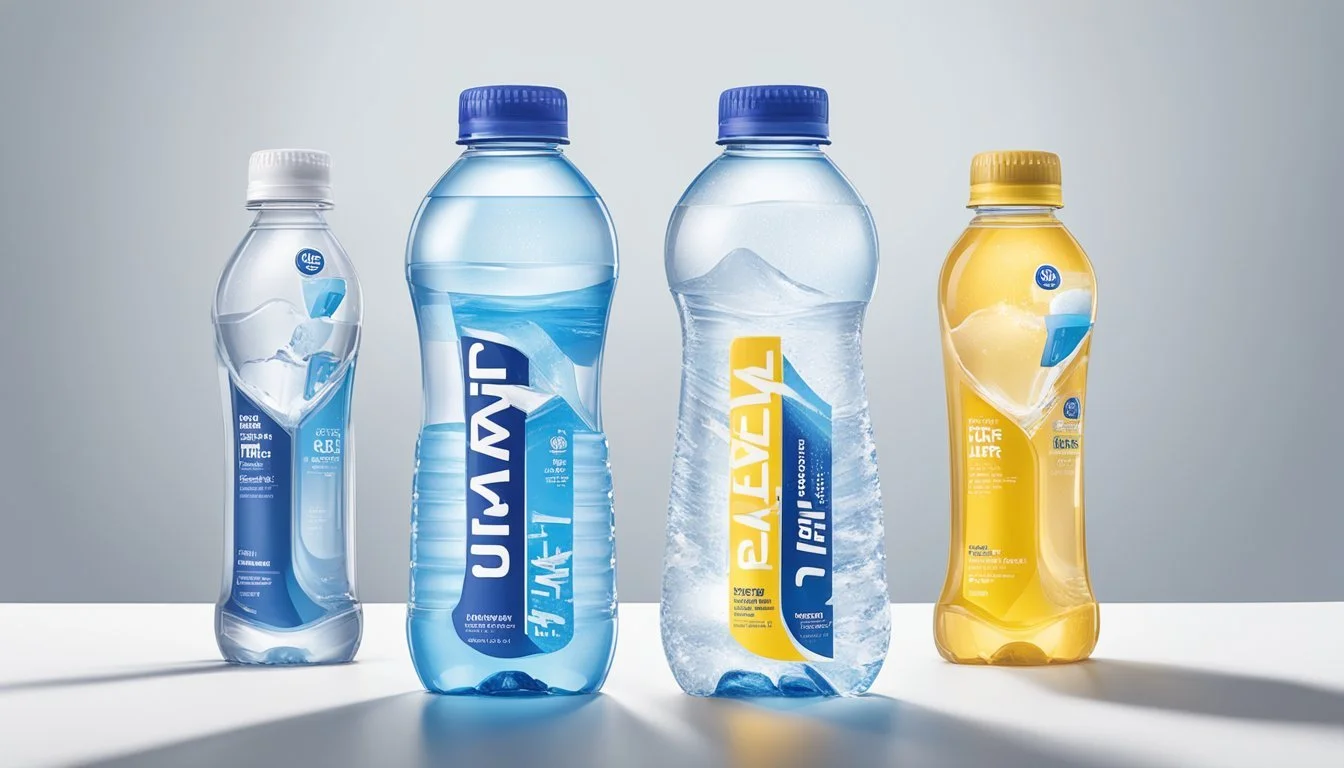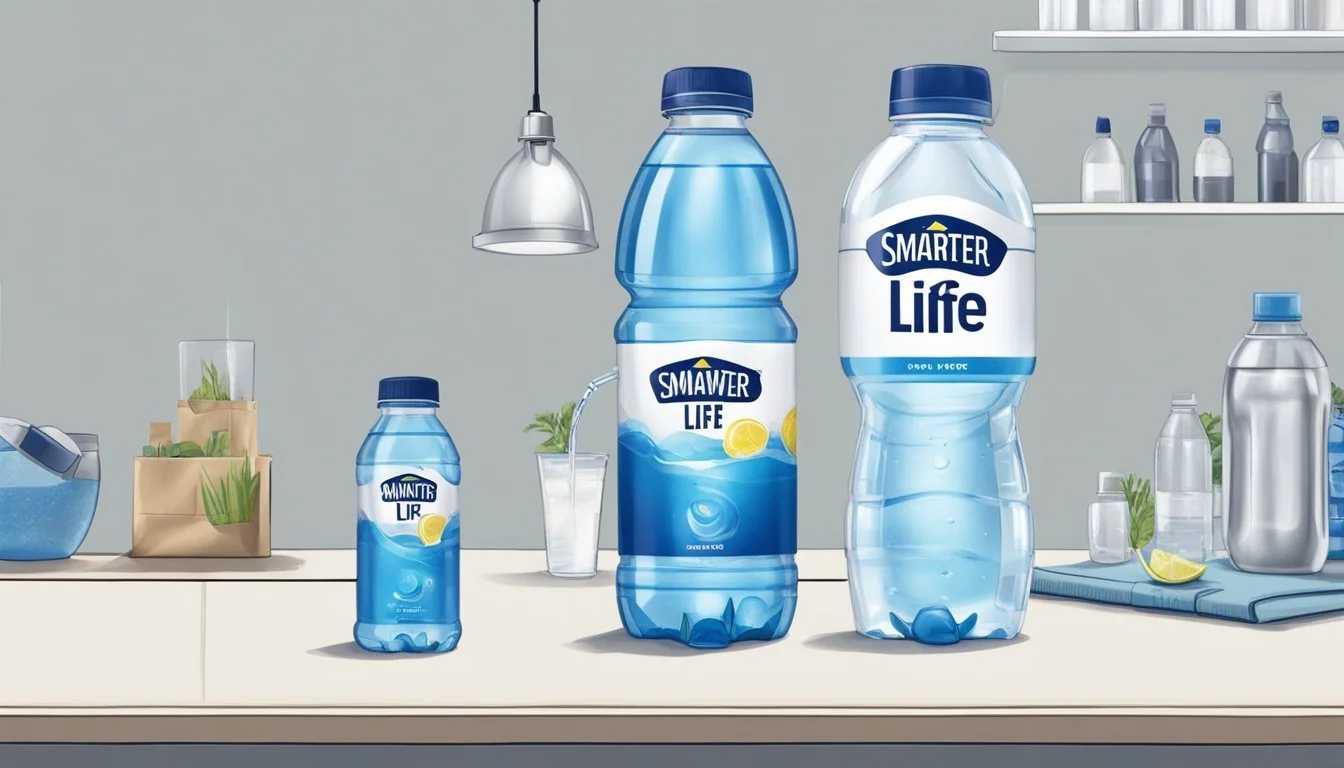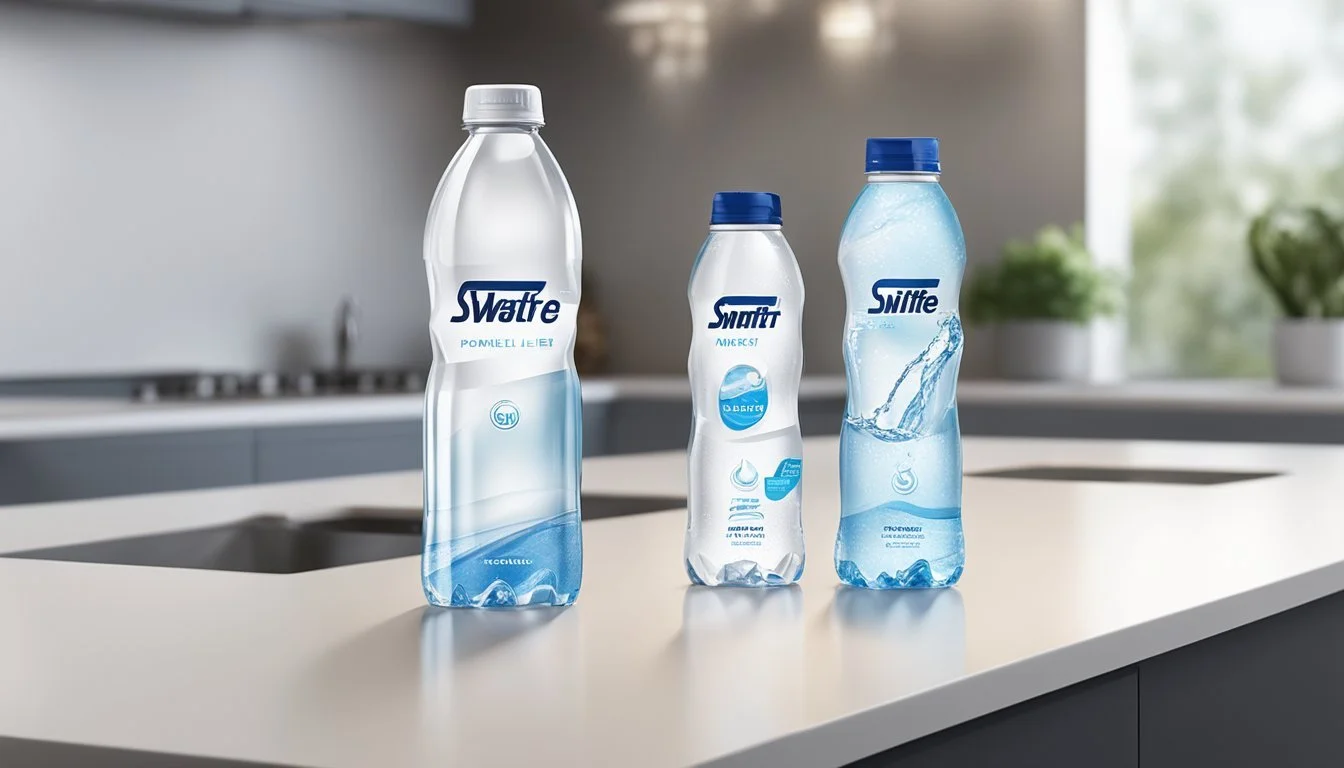Smartwater vs. Pure Life
Analyzing the Best Choice
When it comes to choosing between Smartwater and Pure Life, hydration and taste are often the top considerations for consumers. Both brands are well-known in the market, but they offer different qualities that cater to various preferences.
Smartwater is celebrated for its clean and crisp taste, achieved through vapor distillation and the addition of electrolytes. For those who prioritize a pure and refreshing drinking experience, Smartwater stands out as a superior choice. On the other hand, Pure Life by Nestlé is popular for its wide availability and affordability, making it a convenient option for everyday hydration needs.
Despite the difference in their processing methods and taste profiles, both Smartwater and Pure Life serve as reliable options for staying hydrated. Each has its own unique appeal, whether it’s the sophisticated taste of Smartwater or the practicality and accessibility of Pure Life.
Understanding Bottled Water
Bottled water differs from tap water in significant ways, offering various types catering to different consumer needs. These variations typically include differences in source, treatment processes, and added minerals or electrolytes.
What Makes Bottled Water Different
Bottled water often emphasizes purity, achieved through filtration and treatment processes. Brands aim to remove contaminants found in tap water.
Many bottled waters include added minerals and electrolytes. These additions can enhance taste and offer perceived health benefits.
Bottled water stands out for its portability. Convenient packaging caters to on-the-go lifestyles, providing a reliable hydration source whether at work, gym, or travel.
Types of Bottled Water
Spring Water: Sourced from natural springs, this type often contains natural minerals and offers a distinct taste.
Purified Water: Undergoes extensive filtration processes, such as reverse osmosis, to remove impurities. It’s known for its clean taste.
Mineral Water: Contains minerals naturally present in the source water. It is often marketed for its potential health benefits.
Alkaline Water: Enhanced to have a higher pH level. This is marketed on claims of balancing body pH and other health benefits.
Electrolyte Water: Branded for athletes, containing added electrolytes like sodium and potassium to aid in hydration and recovery.
These types cater to different tastes and health preferences, offering consumers a variety of options to choose from.
Brand Profiles
Smartwater and Pure Life represent two distinct approaches to bottled water, with both brands having unique characteristics and market positioning.
Smartwater Overview
Smartwater is produced by Coca-Cola and is known for its vapor-distilled water process. This method involves evaporating water to ensure that impurities are removed, followed by condensation to create purified water.
Smartwater often includes added electrolytes, such as calcium, magnesium, and potassium, which aim to enhance taste. The pH level for Smartwater typically ranges around neutral, and they offer a version called Smartwater Alkaline, which has a higher pH level. The brand promotes itself as a clean and refreshing option among premium bottled waters, appealing to those seeking purity and hydration.
Pure Life Overview
Pure Life, a brand under Nestlé, utilizes reverse osmosis in its water purification process. This technique involves filtering water to remove contaminants and impurities, ensuring safety and taste consistency.
Pure Life sources its water from a variety of municipal supplies and natural sources. The brand is known for providing affordable and reliable bottled water, making it accessible to a wide demographic. While Pure Life does not market itself as a premium option, it maintains a strong presence in the bottled water market due to its focus on safety and availability.
Filtration and Purification
Smartwater and Pure Life employ different advanced techniques to ensure the purity and quality of their bottled water. These methods are central to their product differentiation.
Filtration Processes
Smartwater uses a process called vapor distillation. In this technique, water is heated until it turns into vapor, leaving impurities behind. The vapor is then cooled and condensed back into liquid form. This method effectively removes most contaminants.
Pure Life, on the other hand, employs reverse osmosis. This process forces water through a semi-permeable membrane, filtering out impurities such as bacteria, viruses, and chemicals. It is highly effective at producing purified water.
Both companies also utilize ultraviolet light treatment to eliminate any remaining microorganisms.
Unique Properties of Smartwater and Pure Life
Smartwater's vapor distillation gives it a distinct clean taste. Post-distillation, they add electrolytes like calcium, magnesium, and potassium for taste enhancement and electrolyte balance.
Pure Life emphasizes its multi-step purification, including reverse osmosis and additional filtration. This ensures high quality and purity. They also fortify their water with a blend of minerals, contributing to a balanced and refreshing flavor.
In summary, the meticulous filtration processes used by both brands highlight their commitment to providing purified and healthy drinking water.
Taste and Quality
Both Smartwater and Pure Life offer unique taste and quality experiences shaped by their sourcing and purification processes.
Factors Affecting Taste
Several factors influence the taste of bottled water. Mineral content is a major contributor, with higher mineral concentrations adding distinct flavors. Sourcing from natural springs or other pristine environments can result in a more clean-tasting product.
Filtration and purification methods also affect taste. Smartwater uses vapor-distillation which can yield a very pure and crisp flavor profile. In contrast, Pure Life often undergoes multiple stages of purification, including reverse osmosis, which eliminates impurities and ensures a consistently clean taste. Packaging can indirectly affect taste, as some people may perceive a slight plastic flavor.
Comparative Taste Analysis
When comparing Smartwater and Pure Life in terms of taste, Smartwater typically has a cleaner, crisper taste due to its vapor-distillation process. This method removes most impurities, creating a pure, smooth flavor profile that many find refreshing.
Pure Life, though still clean-tasting, presents a more neutral flavor due to its multi-stage purification process. Some may notice a slight metallic or mineral aftertaste, possibly from its lower mineral content. While it may lack the distinctive crispness of Smartwater, it offers reliable, everyday hydration.
Both brands aim for a consistent quality, but their unique processes highlight their individual flavor characteristics. The preference between the two often comes down to individual taste preferences and the desired drinking experience.
Health and Hydration
Both Smartwater and Nestlé Pure Life offer significant benefits for hydration and overall health. They cater to different needs concerning electrolytes and mineral content, which can influence fluid balance and nerve signaling.
Hydration Benefits
Smartwater and Nestlé Pure Life serve the essential need for hydration, crucial for maintaining general health.
Smartwater, being vapor-distilled, aims to provide pure water, free from contaminants. This process ensures that the water is clean and free from impurities, contributing to effective hydration.
Nestlé Pure Life, utilizing a rigorous purification process, also ensures clean and safe drinking water.
Maintaining hydration contributes to many body functions, including temperature regulation and digestion. Proper hydration supports skin health, energy levels, and cognitive function.
Electrolytes and Mineral Content
Electrolytes and minerals play a significant role in the overall health benefits of bottled water.
Smartwater is enriched with electrolytes like potassium, magnesium, and calcium. These additions are meant to enhance taste and may assist with fluid balance and nerve signaling. For those looking for additional mineral intake, Smartwater’s formulation can be beneficial.
Nestlé Pure Life focuses on purity and cleanliness, with its mineral content primarily coming naturally from the water source. While it might not have the added electrolytes like Smartwater, it still provides essential minerals that support various bodily functions.
High-quality mineral content in both brands helps maintain fluid balance and support nerve signaling, ensuring proper hydration and overall well-being.
By choosing the right bottled water, consumers can potentially enhance their hydration and support their health with the right balance of electrolytes and minerals.
Packaging and Sustainability
The packaging and sustainability of bottled water brands are important factors to consider. Smartwater and Pure Life offer different approaches in terms of bottle design and materials, as well as their environmental impact.
Bottle Design and Materials
Smartwater features sleek, modern bottle designs that are often made with BPA-free plastic. The minimalist label design and transparency of the bottles emphasize a clean and pure look.
Pure Life also uses BPA-free plastic for their bottles. The design is more straightforward, with emphasis on practicality and wide availability.
Both brands focus on user convenience with resealable caps and lightweight materials. Smartwater’s design often appeals more to health and fitness enthusiasts, while Pure Life targets a broad demographic with its utilitarian approach.
Environmental Impact
Smartwater and Pure Life both use recyclable PET plastic in their bottles. Smartwater has made strides towards sustainability by incorporating recycled plastic in their production processes.
Pure Life, manufactured by Nestlé, has emphasized improvements in water stewardship and reducing carbon footprints. However, the company faces criticism regarding its overall environmental practices.
The impact of transportation, energy consumption in production, and the recycling programs available all contribute to the environmental footprint of each brand. Consumers may look for certifications or initiatives that these brands participate in to gauge their commitment to environmental sustainability.
Regulations and Safety Standards
Bottled water brands like Smartwater and Pure Life must adhere to stringent safety guidelines. These standards ensure the water is safe for consumption and meets quality requirements set by regulatory bodies.
Compliance with FDA
Smartwater and Pure Life both follow the FDA's Current Good Manufacturing Practices (CGMP) for bottled water. This means they must meet specific regulatory requirements for processing and bottling.
The FDA classifies bottled water as a food product, ensuring that it is processed under sanitary conditions and free from harmful contaminants. Labels must accurately reflect the contents.
Regular inspections and strict oversight ensure that these brands comply with the legal standards.
Contaminant Testing
Contaminant testing is a key component of bottled water safety. Smartwater and Pure Life undergo rigorous testing for various contaminants, including PFAS chemicals, heavy metals, and microbial pathogens.
Testing covers both the water source and the final product to ensure no harmful substances are present.
Advanced filtration and purification methods, such as reverse osmosis and vapor distillation, help achieve high safety standards. These processes remove impurities, making the water safe and clean for consumers.
Market and Consumer Preferences
Smartwater and Pure Life occupy distinct positions in the bottled water market. Understanding how these brands are perceived and the trends affecting consumer choices can provide valuable insights into their market success.
Brand Perceptions and Reputation
Smartwater is often marketed as a premium brand, leveraging its unique selling points such as vapor distillation and the addition of electrolytes. This gives it a reputation for purity and refreshing taste, appealing to health-conscious consumers.
Pure Life, on the other hand, is associated with affordability and widespread availability. It is often seen on retail shelves, from grocery stores to convenience shops, making it a go-to choice for everyday hydration.
Smartwater's high price points position it as a luxury item, while Pure Life's competitive pricing appeals to budget-conscious consumers. Each brand cultivates loyalty through targeted advertising and distinct packaging designs, influencing consumer preferences significantly.
Consumer Trends in Bottled Water
The bottled water market reflects broader beverage consumption trends, with a growing preference for healthier alternatives to sugary drinks. Consumers seek purity, convenience, and specific health benefits.
The demand for bottled water is driven by an increased awareness of hydration's role in overall well-being. Products like Smartwater cater to this trend with emphasis on superior purification methods, while Pure Life emphasizes easy access and affordability.
Emerging trends include eco-friendly packaging and sustainability efforts, impacting consumer choices. Brands that address environmental concerns may gain favor among increasingly eco-conscious buyers.
Conclusion
In comparing Smartwater and Pure Life, key differences emerge in sources and purification processes.
Smartwater utilizes vapor distillation, closely replicating the hydrologic cycle, ensuring high purity. It includes added electrolytes for taste, contributing to its crisp flavor profile.
Pure Life, sourced from protected wells and springs, uses a multi-step filtration process. It’s known for its consistent mineral balance and accessibility.
Price can be a deciding factor. Smartwater tends to be higher priced due to the distillation process and added electrolytes. Pure Life offers a more budget-friendly option, widely available in various pack sizes.
When considering hydration needs, both brands comply with strict safety standards. Smartwater's electrolyte-enhanced formula may appeal to those seeking a refreshing taste. Pure Life's affordability and balanced minerals make it a go-to option for daily hydration.
Packaging also varies. Smartwater often features sleek, modern bottles, enhancing its premium image. Pure Life focuses on practicality with recyclable options.
Ultimately, the "best bottled water" depends on individual preferences for taste, budget, and packaging. Both brands deliver quality options suitable for different hydration needs.
More About Smartwater
Core Hydration vs Smartwater: Which Bottled Water is Better?
Icelandic Glacial vs Smartwater: Which Bottled Water is Better?
Mountain Valley Spring Water vs Smartwater: Which Bottled Water is Better?
Nestle Pure Life vs Smartwater: Which Bottled Water is Better?
San Pellegrino vs Smartwater: Which Bottled Water is Better?
Smartwater vs Aqua Carpatica: Which Bottled Water is Better?
Smartwater vs Cascade Mountain: Which Bottled Water is Better?
Smartwater vs Crystal Geyser: Which Bottled Water is Better?
Smartwater vs Hawaii Volcanic: Which Bottled Water is Better?
Smartwater vs Hawaiian Springs: Which Bottled Water is Better?
Smartwater vs Kirkland Signature: Which Bottled Water is Better?
Smartwater vs Richard's Rainwater: Which Bottled Water is Better?
Smartwater vs Solan de Cabras: Which Bottled Water is Better?
Smartwater vs Talking Rain AQA: Which Bottled Water is Better?
Smartwater vs Whole Foods 365: Which Bottled Water is Better?
Smartwater vs Whole Foods Italian Still Mineral water: Which Bottled Water is Better?
More About Pure Life
Cascade Mountain vs Pure Life: Which Bottled Water is Better?
Hawaii Volcanic vs Pure Life: Which Bottled Water is Better?
Hawaiian Springs vs Pure Life: Which Bottled Water is Better?
Icelandic Glacial vs Pure Life: Which Bottled Water is Better?
Nestle Pure Life vs Pure Life: Which Bottled Water is Better?
Pure Life vs Kirkland Signature: Which Bottled Water is Better?
Pure Life vs Whole Foods 365: Which Bottled Water is Better?
Richard's Rainwater vs Pure Life: Which Bottled Water is Better?
Solan de Cabras vs Pure Life: Which Bottled Water is Better?
Talking Rain AQA vs Pure Life: Which Bottled Water is Better?
Whole Foods Italian Still Mineral water vs Pure Life: Which Bottled Water is Better?




